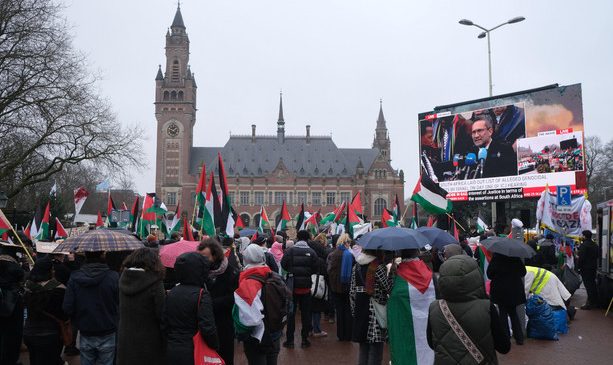
On January 2, Israeli officials confirmed that Israel would be represented at the ICJ to oppose the South African government’s application. South Africa contends that Israel has violated the Genocide Convention by committing genocide against Palestinians in Gaza, and by failing to prevent it, including by not holding senior Israeli officials and others accountable for their direct and public incitement to genocide. The case is not a criminal proceeding against individuals but seeks a legal determination of state responsibility for genocide.
While the case may take several years to reach a final ruling, South Africa has asked the court to order provisional measures to protect the Palestinian people in Gaza from further harm, ensure Israel’s compliance with the Genocide Convention, and safeguard South Africa’s ability to have the case fairly adjudicated. South Africa has asked the ICJ to issue these measures “as a matter of extreme urgency,” saying that Palestinians in Gaza are in “urgent and severe need of the Court’s protection.” Arguments on the request for provisional measures are the subject of the January 11 and 12 hearings.
The court will hear Israel’s formal response on January 12. Israel’s Foreign Affairs Ministry, in a published statement on December 29, 2023, described South Africa’s application as “blood libel” and that the claim “lacks both a factual and a legal basis and constitutes despicable and contemptuous exploitation of the Court.” One media report said that the Israeli Foreign Ministry instructed its diplomats to press officials in their host countries to issue statements against South Africa’s case. The Israeli foreign minister has also specifically urged the United Kingdom to oppose South Africa’s application. The media reported on January 9 that UK Foreign Secretary David Cameron said that he did not think the ICJ case was helpful.
Israeli authorities and Palestinian armed groups have committed serious abuses during the current hostilities. Hamas and other Palestinian armed groups deliberately killed hundreds of civilians in Israel on October 7 and took more than 200 hostages. The Israeli government then cut electricity, fuel, food and water to Gaza’s population and severely curtailed life-saving humanitarian aid, all acts of collective punishment, a war crime. Israeli authorities are also using starvation of civilians as a method of warfare in Gaza, which is also a war crime, Human Rights Watch said.
Past ICJ practice suggests that a decision on provisional measures could be delivered within weeks. Though such an order would be legally binding on Israel, it would not prejudge the merits of the allegations that Israel has violated the Genocide Convention. A provisional measures order is automatically sent to the UN Security Council pending a final decision in the case.
South Africa, which ratified the Genocide Convention in 1998, brought its case under article 9 of the convention, which allows for disputes between parties to be submitted to the ICJ. The court previously confirmed that all member states of the convention have a duty to prevent and to punish genocide. Israel has been a party to the Genocide Convention since 1951.
South Africa together with Bangladesh, Bolivia, the Comoros, and Djibouti also referred the Palestine situation to the International Criminal Court prosecutor in November 2023. South Africa asked the prosecutor, Karim Khan, to investigate the crime of genocide among other grave abuses in Palestine with a view to charging the individuals responsible. Khan confirmed that his office has been conducting, since March 2021, an investigation into alleged atrocity crimes committed in Gaza and the West Bank since 2014, and that he has jurisdiction over crimes in the current hostilities between Israel and Palestinian armed groups that covers unlawful conduct by all parties. He visited Israel and Palestine in December.
In a related matter, in December 2022 the UN General Assembly requested an advisory opinion from the ICJ on the legal consequences of Israel’s prolonged occupation of the West Bank and Gaza. The General Assembly first asked the ICJ for an advisory opinion related to the Occupied Palestinian Territory 20 years ago. In 2004, the ICJ’s advisory opinion found that the route of Israel’s separation barrier violated international law and that it should be dismantled. The December 2022 request is wider in scope. South Africa, among other countries, filed a written statement in the proceeding. The ICJ will convene public hearings on the request starting on February 19.
“How many more alarm bells have to ring and how many more civilians must unlawfully suffer or be killed before governments take action,” Jarrah said. “South Africa’s genocide case unlocks a legal process at the world’s highest court to credibly examine Israel’s conduct in Gaza in the hopes of curtailing further suffering.”
